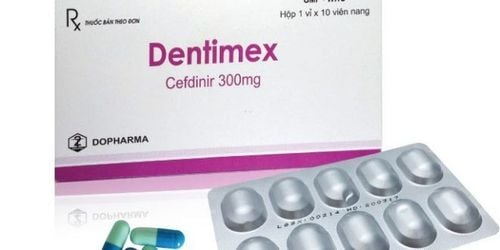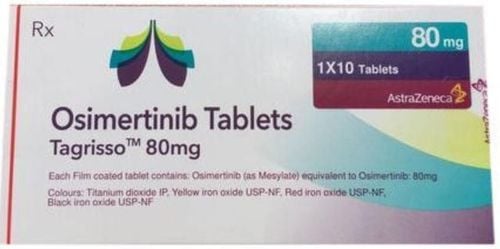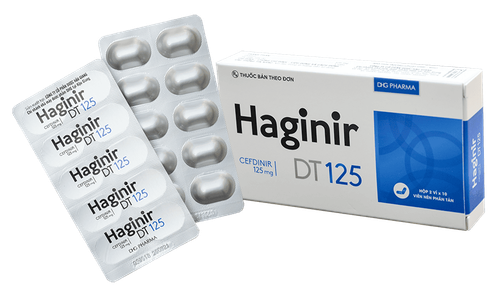This is an automatically translated article.
Medsidin is a drug containing the active ingredient Cefdinir to treat bacterial skin infections, community-acquired pneumonia, chronic bronchitis, rhinitis, sinusitis,... To ensure the effective use of Medsidin, users You need to follow the instructions of your doctor, and refer to the following article for more information about the uses of Medsidin.
1. What are the uses of Medsidin?
1.1. What is Medsidin? Medsidin drug belongs to the group of drugs to treat parasites, anti-infectives, antivirals, antifungals; with registration number VD-24166-16 (with content of 100mg), VD-24762-16 (with content of 125mg), VD-24167-16 (with content of 300mg).
Medsidin has the main active ingredient is Cefdinir 100mg, 125mg and 300mg and the excipients are just enough.
Medsidin medicine has many dosage forms such as:
Powder pack for oral suspension 125mg, packing 1.5g, box of 12 packs - 20 packs - 50 packs or 100 packs. Tablet form 100mg and 300mg, blister of 10 tablets, box of 1 blister - 2 blisters - 10 blisters. Medsidin is a prescription drug (ETC) and is recommended for use in children from 6 months of age (in powder pack form), to adults.
1.2. What does Medsidin do? Medsidin is an excellent solution in the treatment of infectious diseases that cause both upper and lower respiratory tract infections. Medsidin is prescribed by doctors for the treatment of mild and moderate infections caused by susceptible bacteria to:
Adults and children over 12 years of age:
Lower respiratory tract infections, including both community-acquired pneumonia and acute exacerbation of chronic bronchitis caused by S. pneumoniae (penicillin-susceptible strains), H. Parainfluenzae, H. influenzae or M. catarrhalis (including bacterial strains) beta-lactamase bacteria). Upper respiratory tract infections such as acute sinusitis caused by M. catarrhalis (including beta-lactamase producing strains), H. influenzae or S. pneumoniae; tonsillitis or pharyngitis caused by Streptococcus pyogenes. Uncomplicated infections of the skin and skin tissues caused by Streptococcus pyogenes or Staphylococcus aureus. Children 6 months to 12 years of age
Acute otitis media caused by S. pneumoniae (penicillin-susceptible strains), H. Parainfluenzae, H. Influenzae or M. catarrhalis (including beta-lactamase producing strains). Tonsillitis and pharyngitis caused by Streptococcus pyogenes bacteria. Uncomplicated infections of the skin and skin tissues caused by Streptococcus pyogenes or Staphylococcus aureus. Lower respiratory tract infections, including community-acquired pneumonia and acute exacerbation of chronic bronchitis caused by S. pneumoniae (penicillin-susceptible strains), H. Parainfluenzae, H. influenzae or M catarrhalis (including beta-lactamase-producing strains). Contraindications:
Patients who are allergic to the main ingredient Cefdinir or any of the excipients listed above. Children under 6 months of age.
2. Usage of Medsidin
2.1. How to take Medsidin Medsidin is taken orally, patients should take it right after the main meals or about 2 hours after taking iron-containing products or antacids. Tablet form: take the tablet whole with a glass of water as needed, do not break, crush or mix with any other mixture to drink. Oral powder form: mix the drug pack with about 10ml of filtered water, wait for the medicine to completely dissolve or you can mix the medicine with milk to make it easier for children to drink. Patients should strictly adhere to the dose prescribed by the doctor, do not arbitrarily add or reduce the recommended or prescribed dose without the approval of the treating doctor. 2.2. Dosage of the drug Medsidin Adults and adolescents (12 years and older): 600 mg a day, can be taken orally once or divided into 2 times, used continuously for 5 to 10 days. Children from 6 months to under 12 years old: 14mg/kg body weight/day, can be taken 1 time or divided into 2 times, used continuously for 5 to 10 days. Patients with renal failure (with CrCl index less than 30 ml/min): + Adults: The dose should be 300 mg per day.
+ Children: The dose should be 7 mg/kg body weight per day.
Handling when missed dose: Patients need to take the dose of Medsidin as soon as they remember. Usually medications can be taken 1 to 2 hours later than prescribed by your doctor. However, if the current time is too far from the time to take the medicine, skipping the missed dose and never double the dose can be dangerous to your health.
Treatment of Overdose: Information on overdose with cefdinir has not been established in humans to date. Almost only symptoms and signs of toxicity due to overdose of Cephalosporin antibiotics have been reported such as nausea, vomiting, epigastric pain, diarrhea and convulsions. Currently, there is still no specific antidote, in case of overdose, gastric lavage should be performed to remove the unabsorbed drug from the body. Hemodialysis may reduce blood levels of cefdinir, especially in cases of impaired renal function.
3. Notes when using Medsidin
Note when taking Medsidin as follows:
Do not take Medsidin with any other medicine containing cefdinir. Do not use drugs that have expired, change color, clot, or open packaging. Long-term use of the antibiotic cefdinir may result in overgrowth of non-susceptible organisms. Caution should be exercised when using drugs containing cefdinir in patients with a history of colitis or renal failure. Before initiating therapy with Medsidin, it is necessary to determine whether the patient has a history of hypersensitivity to the antibiotic cefdinir, other cephalosporins, penicillins or other drugs. Caution should be exercised when cefdinir is used in penicillin-sensitive patients, due to cross-sensitization between β-lactam antibiotics. Clostridium difficile-associated diarrhea has been reported with most antibiotics, including Medsidin, ranging from mild to severe and possibly life-threatening. Therefore, a differential diagnosis should be made if patients develop diarrhea during or after the use of Medsidin. The drug does not affect the ability to drive and use machines, so it is possible to continue these tasks while taking the drug. Pregnancy: There are no adequate data on the safety of Medsidin in pregnant women. Therefore, pregnant women should only use this medicine when absolutely necessary. Lactation: A single dose of 600 mg a day has not been found to be excreted in breast milk. However, it is still important to consult your doctor before taking Medsidin while breastfeeding.
4. Medsidin side effects
Side effects of Medsidin may occur with the following frequency:
Common
Gastrointestinal: abdominal pain, diarrhea. Infections, allergies: rash, vaginal candidiasis. Nervous system: headache, dizziness, nausea. Uncommon
Digestive disorders: Flatulence, vomiting, loss of appetite, abnormal stools, constipation. Nervous system: Dry mouth, dizziness, weakness, insomnia. Metabolic disorders: pruritus, fungal infections, vaginal discharge in women, vitamin K deficiency, vitamin B deficiency, lower liver enzymes, increased BUN. Instructions on how to manage ADR: When experiencing any serious side effects of the drug such as persistent diarrhea or vomiting, rash or seizures. Patients need to stop using the drug immediately and notify the doctor or go to the nearest medical facility for timely treatment.
5. Medsidin drug interactions
Iron preparations and antacids reduce the absorption of cefdinir. Cefdinir should be taken at least 2 hours apart from these drugs and preparations. Probenecid inhibits renal elimination of cefdinir, resulting in increased peak plasma concentrations of cefdinir and a longer half-life of cefdinir. Co-administration of Medsidin with nephrotoxic drugs (eg, colistin, aminoglycoside, polymyxin B, vancomycin) may increase the possibility of nephrotoxicity. Patients should avoid co-administration of the above mentioned drugs with drugs containing cefdinir. False positive results for ketones in the urine can occur during the use of Medsidin when tested with nitroprusside. Active ingredient Cefdinir can cause false positive results when testing urine glucose with Benedict's solution, Fehling's solution, Clinitest. Cephalosporins can cause a false-positive direct Coombs reaction.
6. How to store Medsidin
Medsidin storage period is 24 months from the date of manufacture. The drug is stored at room temperature below 30 degrees Celsius, in a cool and dry place, avoiding direct sunlight. Because high temperatures can damage, damage or change the ingredients in the medicine. Do not leave Medsidin in places with high humidity such as bathrooms, refrigerators. Store medicines out of reach of children. Medsidin is a drug containing the active ingredient Cefdinir to treat bacterial skin infections, community-acquired pneumonia, chronic bronchitis, rhinitis, sinusitis,... To ensure effective treatment and avoid side effects unwanted side effects, the patient should strictly follow the instructions of the doctor, professional pharmacist.
Follow Vinmec International General Hospital website to get more health, nutrition and beauty information to protect the health of yourself and your loved ones in your family.













